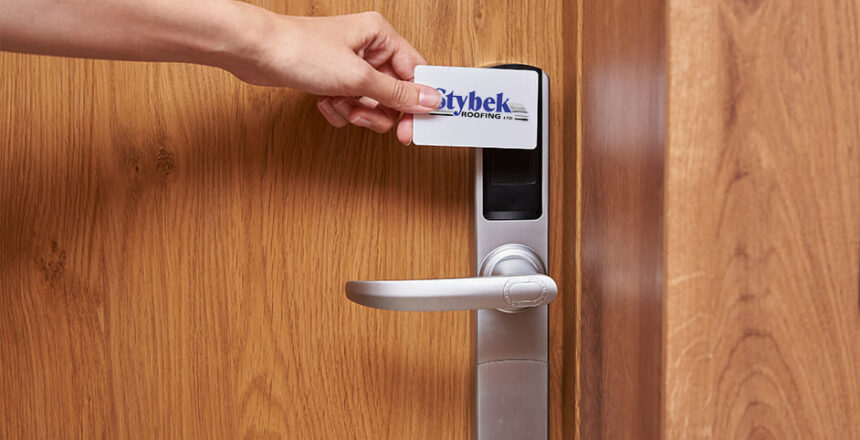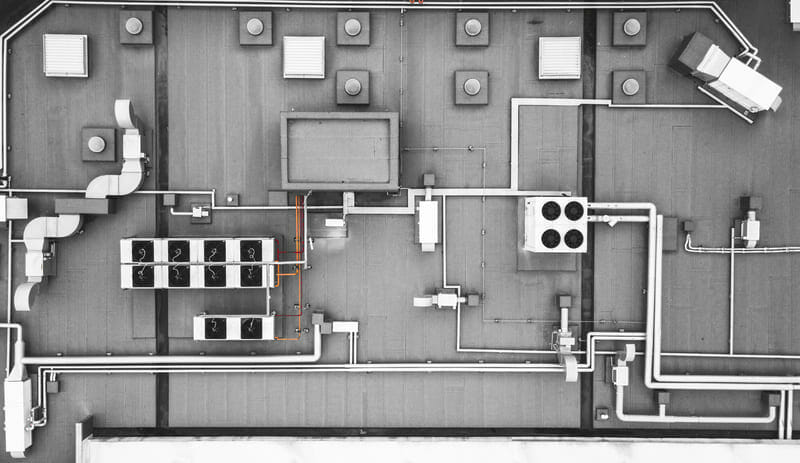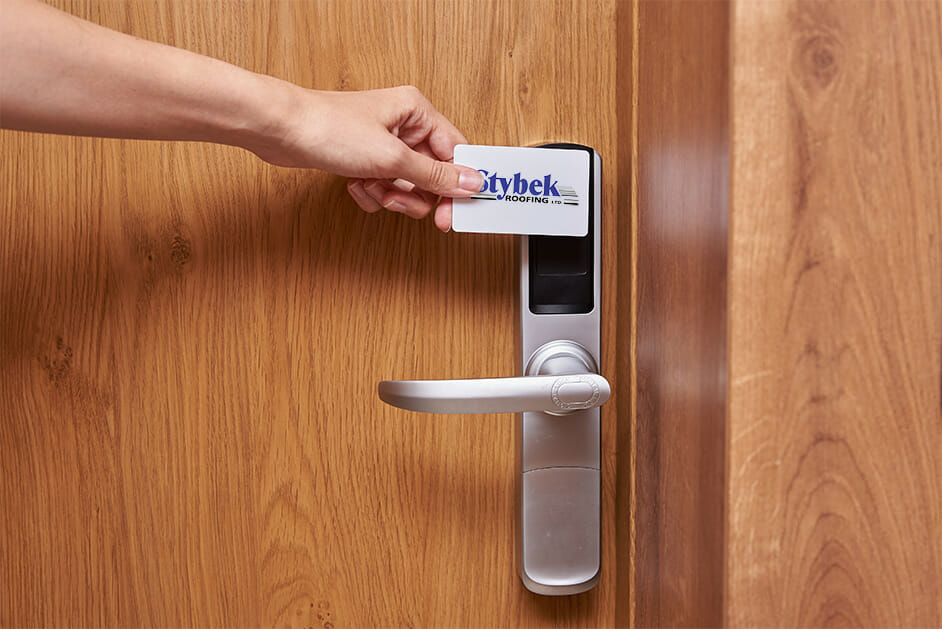My cat absolutely HATES closed doors.
The moment she hears that ominous click, she’s right there, and won’t leave until the door opens again. When it does, half the time she won’t even go in the room. She just looks around, visibly relaxes, and moves on.
I’ve heard a lot of reasons why cats do it: they’re curious, they don’t like their territory blocked off anywhere, or they don’t like being separated from the rest of their ‘clowder.’ (That’s the official name for a gang of cats, and it includes you!)
Whatever her reason, I can relate. I’m not a fan of closed doors either. In the commercial roofing industry, an office doorway often acts as the dividing line between employees and management, and when it’s closed, it’s rarely for a reassuring reason. This is one of the reasons why the doors stay open at Stybek Roofing.
What a Closed Door Really Says in Commercial Roofing
While there are legitimate reasons for a closed door, in my opinion, there aren’t a lot of them. In most cases, a closed office door can:
- Distance a manager from daily interactions with their team
- Create an ‘us vs. them’ mentality that makes team efforts nearly impossible
For commercial roofing businesses that claim they have a culture of transparency, a closed door sends the opposite message. Your workers are going to be unsure when they can ask for guidance or even interrupt. Over time, they’re not only going to be less engaged with management, but they’re also going to be less trusting. Eventually, they’ll leave.
A few years ago, Inc. published an article suggesting that closed office doors “freak people out.” Citing a recent study, it suggested that a closed door can be perceived as-
- Bad news for those shut out
- The desire to display authority and power
The article stated:
“Because a shut door sends this message of division, people become scared not just of the hardship that could be coming, but of not being included anymore. We feel like we’re being shut out, discarded, or labelled as not good enough.”
That’s NOT the message I support or want to send.
When a Door Closes, Growth Stops in Commercial Roofing
At Stybek Roofing, one of our core values is growth. All team members should be excited about the personal growth opportunities at this company. Our strength is our people, so we should all prosper together.
Although every commercial roofing company is different, this inclusive outlook isn’t shared by the industry as a whole. In a lot of environments, roofing management doesn’t treat their employees very well.
In those places, it’s simply easier to rule with a heavy hand. People are disciplined and publicly shamed for seeing or doing things differently, and there’s a clear line between office and field personnel. That outlook doesn’t support employee growth, so it has no place here.
I had a manager who regularly shut his office door when meeting with foremen or workers. When Stybek transitioned toward a more open and communicative environment, he didn’t like it and left. We took the door away from his old office and stored it upstairs. It was very symbolic in that the door had been a barrier to what we were trying to achieve.
How Did Employees React to an Open-Door Policy?
Although removing a door was a small change, the impact was huge. Some people, especially those who were so indoctrinated by the old way, couldn’t work with the new system and left. Others were perplexed at first but quickly embraced it. Still more were relieved and enthusiastic.
Once everyone processed the change, it improved the flow in the office and encouraged employees to come in and talk about whatever was on their minds- the good, the bad, and the ugly. We also started differing from other companies in ways like the following:
- Information was no longer siloed: if anything happens that affects the company, everybody learns about it.
- Management doesn’t take all the credit while employees get all the blame.
- There’s no more divide between field and office.
- No one is ‘kept in line’ through fear.
Don’t get me wrong- sometimes you have to have uncomfortable conversations with members of your team, but you can do that without intimidating them. I have two small boys, and if I scream or yell at them every time they do something wrong, it’s not only counterproductive- it makes them afraid of me. As a parent, that’s the last thing I want.
When someone’s performance at Stybek needs improvement, we help them understand the problem so they can grow on two levels- personally and professionally. Mistakes can be powerful learning opportunities, and when you address the issue without judgment, I’ve seen great things happen.
In Commercial Roofing, Barriers Are Bad for Business
Let’s go beyond doors for a minute. I think that ANY kind of barrier, either real or perceived, will only hurt the roofing industry. For example:
- For years, the so-called ‘glass ceiling’ has discouraged women from making valuable contributions to the trades. Although more women are going into commercial roofing, they still account for a very small minority.
- Roofing and other trades are still seen as occupations for the unskilled and uneducated. This mindset can discourage young people from seeing roofing as a career or, if they do enter the industry, taking pride in their work.
At Stybek, I’m doing what I can to eliminate these obstacles and misconceptions. While I can only control what I do at my own company, my hope is that over time, the open-door, barrier-free policy here will become contagious. Together, my key players and I want to keep taking the company in a direction that will benefit the industry as a whole.
Opening the Door to Improvement and Growth
When we took the door away from that former manager’s office, the message was clear. There are no barriers at Stybek Roofing, whether it be a closed door, glass ceiling, or anything that prevents personal growth and development.
As a commercial roofing company owner, I know I can’t lead or support employees when I’m inaccessible. For Stybek to grow, everyone needs to know what’s going on at all times. It also needs to be clear that they can come to their manager for advice or guidance when necessary. You can’t do any of that without an open-door policy.
Let’s face it: there will be times when management needs privacy to do their job. However, there are alternatives to shutting yourself away in your office. You can hold meetings in a conference room or over lunch.
When a closed-door meeting is unavoidable, that’s fine when it’s the exception instead of the rule. Should anyone keep forgetting to open the door again afterward, get an office cat. Trust me, that works!





